Share
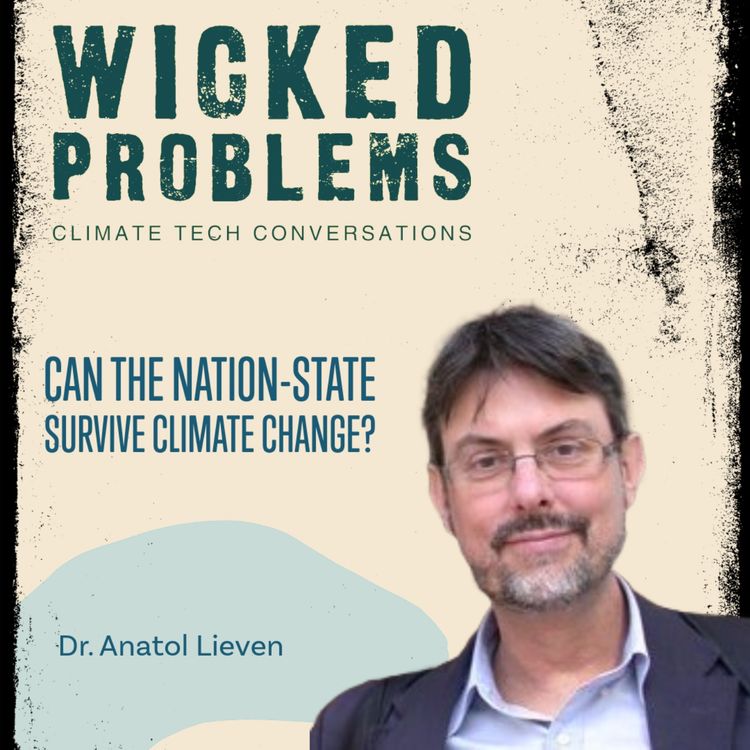
Wicked Problems - Climate Tech Conversations
Dr. Anatol Lieven: Can the Nation-State survive climate change?
In this episode of Wicked Problems - Climate Tech Conversations, we delve into the intersecting crises of climate change, internal disintegration, and global security with Dr. Anatol Lieven, Quincy Institute Eurasia programme director. With a stellar career as a journalist, scholar, and author, Dr. Lieven brings a wealth of expertise to discuss the mounting challenges facing democracies worldwide.
Key Topics Discussed:
* Security Establishments and Climate Change:Dr. Lieven argues that inherited institutional priorities have led security establishments to focus on external threats, while the real challenges lie in internal disintegration driven by climate change, migration, and socioeconomic inequality.
* Green New Deal and Nationalism:A compelling advocate for a Green New Deal, but on “realist” grounds, Dr. Lieven emphasizes the importance of compensating those most affected by climate policies while ensuring that the rich bear their share of the burden. He suggests that patriotism should be harnessed to mobilize public support.
* U.S. Political Crisis and Constitutional Flaws:Lieven critiques the U.S. Constitution as "not fit for purpose" and explores the potential for a severe political crisis in the event of a contested 2024 election. He underscores the danger of both sides refusing to back down.
* Global Shocks and the Importance of Resilience:The need to build resilience against global shocks is paramount, argues Lieven. He discusses how competition with China can help, but warns that "just-in-time" supply chains are profoundly dangerous.
* Migration and Internal Stability:Migration remains a crucial issue affecting Western democracies, and Dr. Lieven describes how differing ideas about national identity can lead to severe polarization. He likens it to the challenges facing Middle Eastern democracies.
Dr. Lieven’s Catalysts
* The Uninhabitable Earth by David Wallace-Wells
* The Economics of Climate Change: The Stern Review by Nicholas Stern
* Collapse: How Societies Choose to Fail or Succeed by Jared Diamond
About the Guest: Dr. Anatol Lieven is the Director of the Eurasia Program at the Quincy Institute for Responsible Statecraft. He has had a distinguished career as a journalist covering the former Soviet Union and Pakistan and has held academic positions at King's College London and Georgetown University in Qatar. He is the author of Climate Change and the Nation State.
Rate and Review us: Spotify | Apple Podcasts
Connect with Us:
Follow Anatol Lieven:
More episodes
View all episodes

7. Rumble in the Jungle COP
40:12||Season 4, Ep. 7Full show notes, transcripts, and more at wickedproblems.earth Welcome to Belém, where the world (with some notable exceptions) has gathered to talk about saving the Amazon as if it weren’t already on fire. Cataloguing the chaos leading up to COP30 Ben Cooke of The Times. His team’s reporting makes clear why the mood isn’t exactly jubilant: the clean-power alliance with zero members, the rainforest pledges with little progress, and the renewed swagger of fossil petrostates. Even potential bright spots, like the Tropical Forest Forever Facility announced last week, were somewhat dimmed by the spectacle of UK prime minister Keir Starmer reversing an earlier decision not to go to COP, only to make the trip to then announce his government wouldn’t be part of the hoped-for signature initiative out of this event.We chat with Ben about all of that and more.
6. Trump nukes Net Zero Shipping
01:26:07||Season 4, Ep. 6Full show notes and ad-free listening at wickedproblems.earthShipping is one of those things that’s just supposed to work. Post-Titanic, we created a set of rules that currently are looked after by the International Maritime Organization (IMO), which successfully removed much of the drama from shipping — so successful that Britain’s “Shipping Forecast” is now soothing ASMR for bedtime listening. But last month at the IMO in London, what should have been a procedural meeting on decarbonising shipping turned into something far messier. According to a Financial Times investigation, U.S. officials didn’t just lobby against a global carbon levy on shipping — they allegedly threatened, intimidated and black-mailed delegates from smaller nations. Developing-country delegates said they were warned their ships would face higher U.S. port fees, their officials denied visas, and their trade punished if they didn’t abandon support for the Net Zero Framework the IMO had endorsed only six months earlier. “It was like dealing with the Mob,” one diplomat told the FT. In the end, it worked. The deal — the world’s first carbon-pricing mechanism for global shipping — was postponed for a year. The IMO, normally the most technocratic of international bodies, was left “in a state of complete shock.” For the uninitiated this may sound arcane. But shipping matters. Roughly 90 % of global trade moves by sea; the sector accounts for about 3 % of global CO₂ emissions — more than Germany — and until now has been largely outside the reach of meaningful climate regulation. The Net Zero Framework was meant to change that. It had already been provisionally agreed by a majority of countries in April. But by October, something changed. Countries like China, India, Panama, Liberia — and even Greece and Cyprus, who broke with the EU line — suddenly voted to adjourn. news.wickedproblems.ukAnd the shift didn’t come from nowhere: it came from pressure. From a U.S. administration that now treats climate policy as an existential threat to American interests.🎧 Who we spoke toCarly Hicks (Chief Strategy & Impact Officer, Opportunity Green) explains how the IMO had once seemed one of the last genuinely global forums where climate ambition could meet technical reality — until the process was capsized by politics. Ariane Morrissey (Senior Editor, Ship.Energy) was in the building as the talks imploded, describing a surreal scene where delegates who came to discuss fuel standards found themselves under threats of sanctions and visa bans. Professor Tristan Smith (University College London) gave the longer-view: this is less a failure of climate tech than a warning shot about the fragility of multilateralism itself. He argues the US may have bought time — but may also have triggered the rise of regional regulation. The EU’s carbon-trading scheme now covers shipping; Singapore and Japan are exploring carbon levies. The patchwork world is arriving faster than the ships can adjust. 🎵 Outro music: “Sailing By” (1963) layered with a long-wave “Shipping Forecast” transmission — that calm voice reading “Viking, North Utsire, South Utsire…”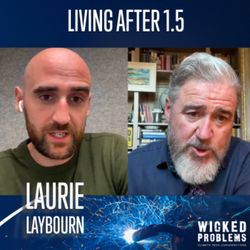
5. Laurie Laybourn on Overshooting 1.5°C
43:26||Season 4, Ep. 5Bonus content at wickedproblems.earth Overshoot, a new four-part documentary series from climate strategist and Wicked Problems alum Laurie Laybourn—goes further than nearly anyone has before. And he came back to unpack some of the key ideas in Overshoot and what he hopes people will do with it.In Overshoot the story starts with the fact that we can no longer avoid the storm, we’ve enetered it. How to survive and steer through it—generation after generation—is the conversation we urgently need to have now. Drawing on interviews with diplomats, scientists, and communities on the frontlines, Laybourn dismantles the win/lose logic that has dominated climate politics since Paris and asks what it means to live in an age of overlapping crises and hard adaptation choices.Our conversation ranges from the myth of Easter Island to the politics of “carbon sucking,” from managed retreat in Wales to the legal aftershocks of 1.5°C’s failure. It’s a clear-eyed look at what comes next—and why, even at the moment of “net zero,” we’ll be living in the most dangerous period in human history.
4. Touch the Feckin' Grass. w Bishop Martin Hayes, Jane Mellett, Eamon Ryan
01:08:54||Season 5, Ep. 4Discussing the Irish contingent at the Raising Hope conference and the future of faith and climate action -Bishop Martin Hayes of Kilmore; former Irish environment minister and Green Party leader Eamon Ryan; and campaigner Jane Mellett, church manager at Irish Catholic overseas development agency Trocaire. More information at climatepilgrim.com.
3. Who is my Tu/Akoi (Neighbour)?
32:21||Season 5, Ep. 3Who is my neighbour? 1.5°C is about neighbours, not numbers. Climate Minister Maina Talia of Tuvalu speaks to Richard Delevan about moral clarity in climate and denies the Australian 'climate visa' is about relocating his population. More information at climatepilgrim.com.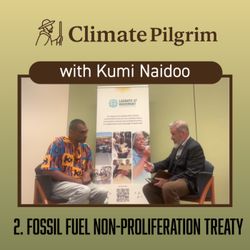
2. The Fossil Fuel Non-Proliferation Treaty, with Kumi Naidoo
55:13||Season 5, Ep. 2Should Pope Leo endorse a Fossil Fuel Non-Proliferation Treaty at COP30? Climate Pilgrim Episode 2: Dr. Kumi Naidoo 'cautiously optimistic' the Vatican and others will add up to 44 countries endorsing Treaty initiative by landmark April conference in Colombia. More detail at climatepilgrim.com.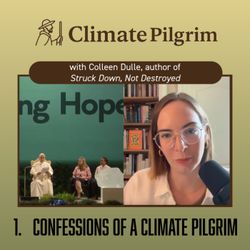
1. Confessions of a Climate Pilgrim
56:45||Season 5, Ep. 1Did Pope Leo double down on climate for the 10th anniversary of Laudato Si'? Or change the relationship between faith and climate action? Colleen Dulle, Vatican Correspondent for America Magazine and author of Struck Down, Not Destroyed, joins Richard Delevan to discuss reactions. More info and episodes at ClimatePilgrim.com.
4. 24/7/365 Dispatchable Solar Is Real. w/ EMBER's Kostantsa Rangelova & Dave Jones
50:37||Season 4, Ep. 4For full show notes, bonus content, and ad-free listening, check out wickedproblems.earthIn this episode of Wicked Problems, host Richard Delevan welcomes Dave Jones and Kostantsa Rangelova from the energy think tank, EMBER. They've spent the past year spreading the good news about the impressive advancements in solar and battery technology, particularly focusing on global trends and potential game-changers in regions such as Africa and Mexico. Despite solar only contributing to 6.6% of Mexico’s electricity, EMBER simulations indicate it could rise to 90% with optimal efficiency. In some spots like Muscat, Las Vegas, or Mexico City, almost all their power, day and night, can now be generated from just solar + battery.The discussion covers the rapid progress and cost reductions in battery technology, the promising shift towards 24/7 solar power, the surge of solar adoption in Africa, and the significant untapped potential in Mexico. The episode highlights the transformative impact of solar and battery technologies on global energy landscapes and emphasizes the urgent need for effective policies to accelerate this transition.00:00 Introduction to Mexico's Solar Potential00:00 Global Governance Breakdown00:36 Welcome to Wicked Problems00:39 Introducing the Guests: Dave Jones and Constanza Rva01:05 The Rise of Solar and Battery Technology01:33 24/7 Solar Power: A Game Changer01:54 Advancements in Battery Technology02:51 Economic Competitiveness of Solar and Battery04:38 Challenges and Innovations in Battery Production08:17 Global Adoption and Market Dynamics15:20 Grid vs. Battery: The Trade-Offs21:05 Solar and Battery in Different Climates24:27 Implications for Policy and Future Outlook26:09 Evolution of Battery Storage27:29 Africa's Solar Boom27:59 Chinese Solar Exports to Africa28:52 Utility Scale Solar in Africa37:50 Challenges and Opportunities in Mexico's Solar Sector47:26 Global Solar Trends and Future Outlook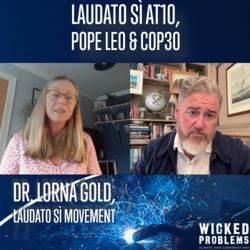
3. Laudato Sì at 10, Pope Leo & COP30, w Dr Lorna Gold
52:56||Season 4, Ep. 3Get bonus content at wickedproblems.earth Dr. Lorna Gold is the executive director of the Laudato Sì Movement, which was inspired by the late Pope Francis’ 2015 letter. That document, considered pretty radical for the leader of the Catholic Church to issue at the time, was credited by former Irish president Mary Robinson and others with influencing the Paris Agreement - and you can hear echoes of it as recently as the advisory opinion issued this summer by the International Court of Justice. On its 10th anniversary, Francis’ successor Pope Leo will lead the Raising Hope Conference, 1-3 October in Rome - but also available via livestream - talking about the relevance of its ideas for the situation we’re in now. More than a “Catholic” thing, it will feature people as diverse as Brazil’s climate minister Marina Silva (in the runup to COP30), climate scientist Dr. Katharine Hayhoe, Bill McKibben, Arnold Schwarzenegger, Tuvalu climate minister Dr Maina Talia, Bianca Pitt of SHE Changes Climate, Fossil Fuel Non-Proliferation Treaty president Kumi Naidoo, and more. Somehow, Lorna was able to take a break from organising the event to speak to us. Lorna earned a PhD in economic geography from Glasgow University and author of Climate Generation: Awakening to our Childrens’ Future.It’s a great chat and we think you’ll enjoy it. In This Conversation01:22 Introduction to Dr. Lorna Gold 02:21 Personal Tragedy and Resilience 05:29 Hope vs. Optimism 09:17 Relevance of Laudato Si' 13:01 International Court of Justice Ruling 15:21 Economic Systems and Climate Action 21:51 Pope Francis, Pope Leo and COP 30 22:31 Upcoming Conference and Call to Action 24:25 Personal Reflection on Climate Impact 27:56 Discussing Future Conversations 28:40 Mother's Role in Climate Action 29:39 Women of Faith for Climate Justice 31:37 The Raging Grannies and Activism 33:12 The Sharing Economy and Climate Generation 34:42 Sufficiency and Economic Inequality 41:17 The Role of Storytelling in Climate Education 44:34 Hope and Action in Climate Movements 47:31 Pope or Nope Quiz